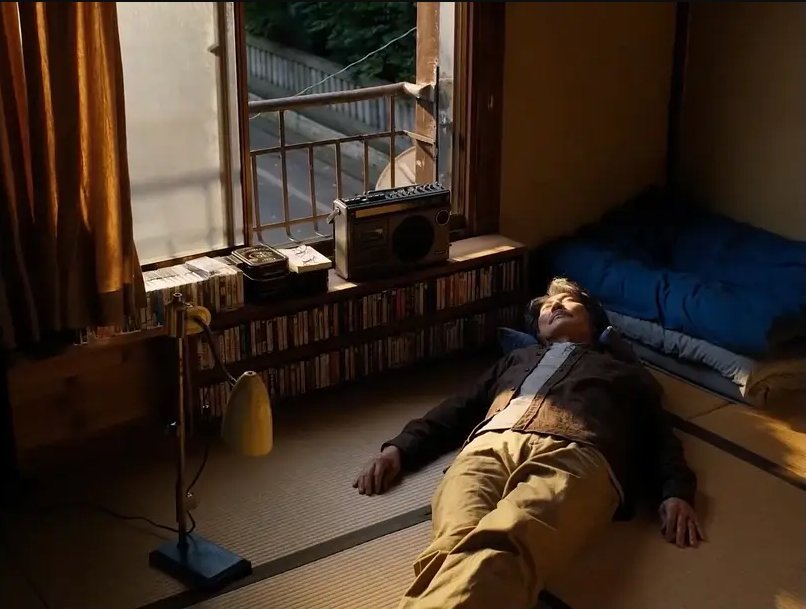Lessons from Perfect Days (a film by Wim Wenders)
WARNING: SPOILERS
I watched Perfect Days by Wim Wenders and it moved me beyond words could ever explain.
The film is about Hirayama, a toilet cleaner in Tokyo who seems to be happy and content with his life. We experience everything in the film through his perspective, taking us through his day and even his dreams.
Hirayama’s mundane routine
We see him waking up every day to the sound of his neighbor sweeping the streets outside. He mists his plants first thing in the morning. He buys the same canned coffee—Boss cafe au lait—from the same vending machine just outside his tiny apartment. He picks a cassette tape to play before driving off to work. He only starts playing the song when he crosses a certain point which seems to be triggered once he sees the Tokyo Sky Tree up close through his windshield. He eats convenience store-bought food for lunch under the same tree which he often takes snapshots of with his analog camera.
His apartment doesn’t have a bathroom so he goes to a nearby onsen after work for a shower and a bath. He eats dinner at the same small restaurant inside Asakusa station. When he gets home, he reads a book before going to bed.
On weekends, he also pretty much follows a routine, though not as structured as his weekdays. He takes his dirty clothes to a coin laundry shop. He goes to the same small film store to have his film developed. He buys a paperback from the same second-hand bookstore.
Hirayama’s past revealed
This mundane routine was then suddenly interrupted when his runaway niece came to his house for temporary refuge. Despite having an unexpected guest, he still managed to keep his everyday routine.
It was not until the mother (Hirayama’s sister) finally came to pick her daughter up in a fancy car with her chauffeur that we were given the chance to speculate about Hirayama’s past, one of them that he may have come from a wealthy family.
We don’t see a lot of drama in their interaction but we see her sister’s futile attempt at convincing him to visit their father in his nursing home sometime. She reassured him that their father doesn’t remember much of the past so there should be nothing for him to be worried about.
They shared a meaningful hug and as she was driving off with her daughter, we saw Hirayama let out a silent sob that could be felt through the screen I couldn’t help but tear up as well.
Why is he crying? I thought he was okay? I thought he was content and happy with his simple life?
The next morning, he went on with this life the way he had always been living it. He still smiles when he looks up at the morning sky as soon as he opens his door to start his day. He is still mesmerized by the trees. His love for music never faded.
It was not until the end of the film that everything made sense to me.
An unforgettable conversation with a dying man
But before we get to that iconic ending scene, there is one more unforgettable part of this film. It was when another character who was terminally ill with cancer came up to Hirayama. He introduced himself as the ex-husband of the snack bar owner that Hirayama frequents on weekends.
In the middle of their silence, he wondered out loud whether shadows turn darker when they overlap. Hirayama laughed it off, taken aback by the question. With deep regret in his voice, the man then said:
「わからない事だらけだな〜 結局、何も分からないまま終わっちゃうんだな〜」
“The world is full of things we do not know about. Life just really ends without us truly knowing anything.”
Hirayama looked around and saw a street lamp. He then proposed for both of them to stand under the lamp to find out, to see if their overlapping shadows could produce a deeper shade.
The man looked at their shadows and believed the shade remained the same. Hirayama, on the other hand, insisted that he could definitely see a deeper shade of grey.
Looking at two grown men arguing like two silly children almost felt like comic relief. But it was more than just a funny scene. It made me wonder if life really just ends without us truly knowing anything just like the terminally ill man suggested.
When we were children, we were hopelessly inquisitive. We set out on little adventures to find out things we were so curious about. We climb trees to have a bite of that fruit hanging just beyond our reach. We had fears, yes, but they had little control over us.
As soon as we grew up, we were forced to participate in a game that we had no say in. We buried our curiosity about anything that does not make money. We barely have time to sleep, let alone for our hobbies. We conform to society’s idea of productivity. We don’t notice the sunlight anymore. We barely talk to our neighbors. We walk with our heads down. We don’t see the eyes of the person serving our food.
It reminded me of Richard Linklater’s Waking Life wherein one of the characters said:
I know we haven't met, but I don't want to be an ant, you know? I mean, it's like we go through life with our antennas bouncing off one another, continuously on ant auto-pilot with nothing really human required of us. Stop. Go. Walk here. Drive there. All action basically for survival. All communication simply to keep this ant colony buzzing along in an efficient polite manner. "Here's your change." "Paper or plastic?" "Credit or debit?" "You want ketchup with that?" I don't want a straw, I want real human moments. I want to see you. I want you to see me. I don't want to give that up. I don't want to be an ant, you know?
In the final minutes of the film, Hirayama's insistence on finding out whether two shadows overlapping could create a deeper shade or not shows us that we certainly have a chance to know something. It tells us that every day is another chance for us to live and therefore another chance for us to discover something about the world or do the things we enjoy doing.
But all of this comes with a price.
This has always been hinted at through the homeless man who was exquisitely portrayed by Min Tanaka which culminated in the ending scene that was equally beautifully executed by Yoji Yakusho, our main protagonist.
Hirayama admires the homeless man when everyone else around him doesn’t even acknowledge his existence. Like him, the homeless man may seem like an outcast, but to him, he has achieved freedom.
The iconic ending scene
Now, onto the iconic ending: At first, Hirayama seemed to be overwhelmed with feelings of bliss and gratitude, especially with his face perfectly lit with the morning sun, amplified by Nina Simone’s Feeling Good playing in the background.
But as the scene progresses, we slowly see a mixture of undeniable sadness and regret in his eyes. It seemed like Hirayama tried really hard to be as grateful and happy as he could be, to enjoy the music like he always does every day, to welcome the new dawn, the new day, but there was just something deep within him that he couldn’t shake off, like a shadow from his past casting over him.
We were never fully allowed to see his past but this long, drawn-out scene allowed us to really see through him.
Yes, he may be content with the life that he chose. He may be happy that he doesn’t have to participate in the capitalist rat race. He may have found fulfillment in his simple daily routine. At one point, his face even expressed satisfaction like he is truly proud of the man that he is. But this doesn’t mean he has evaded sorrow and grief altogether.
The ending scene may be him grieving the people that he had lost along the way. It could be his sister or his niece whom he may never see again. This could be anyone in his past—his parents, possibly other siblings, friends—that we never knew about.
Choosing the life that he chose gave him freedom, but it also meant letting go of important people in his life who, in his words, did not belong in his world.
Freedom is mine, Nina Simone sings in the background as Hirayama drives to work.
But in exchange for what?
Final thoughts on the film
Contentment and grief can coexist—that’s the biggest lesson I learned from this film.
If you’re lucky enough to have the freedom to choose which path to take in life, you will have to make sacrifices. You will have to accept the fact that not everyone fits in your world. But just because you find yourself grieving from time to time doesn’t mean you are not where you are supposed to be.
You can be content with your life and still be sad about it. You can feel fulfilled with who and where you are in life and still be allowed to grieve the people you’ve lost along the way.
There is no such thing as absolute happiness or absolute sadness. You can be content while grieving. You can feel fear while simultaneously feeling at peace. Heck, you can even feel ten different emotions at the same time.
Life is just a myriad of complex emotions that we have to accept and learn to navigate. There will be perfect days, but there will also be awful days. Grief and sorrow are just as fundamentally important as happiness and joy.
Or perhaps, we will all just really die without truly knowing anything, so we might as well take it all in and appreciate the little things while we can—coffee, music, books, food, or even as simple as the sunlight streaming down through the leaves of a tree.




